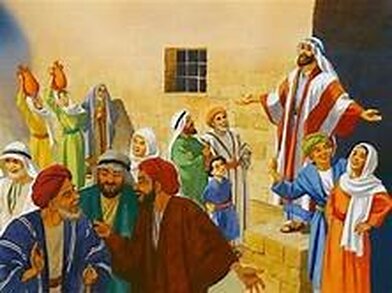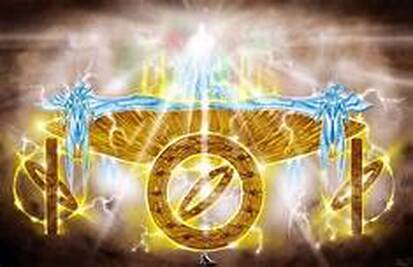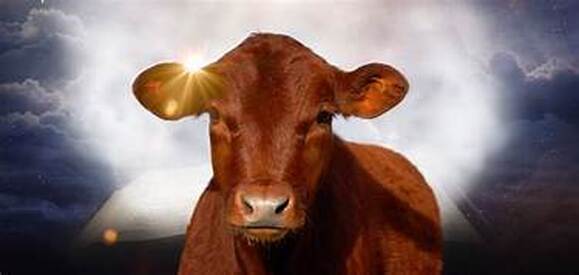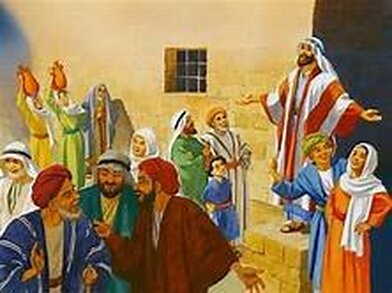They listened, and they let them go. But afterwards, they changed their minds;
(Jer 34:10-11 CJB)
The country is in trouble. Enemies from within and enemies from without threaten its downfall. From within, the sin of the people brought on HaShem's wrath. From without, the Babylonians, under HaShem's command prepare a siege against Judah (Jer 43:10).
As a show of repentance, Zedekiah orders that everyone frees their slaves and indentured workers. This was indeed a law in the Torah (Ex:21:2) but because of greed, people did not want to honor the Day of Jubilee as HaShem required of them. By giving this law, as well as other laws concerning the poor and the disenfranchised in the Land, HaShem teaches us mercy and compassion, which are sadly not part of our human nature. If it were, HaShem would not have had to make this a commandment.
Our Master Yeshua says:
For the way you judge others is how you will be judged -- the measure with which you measure out will be used to measure to you.
(Mat 7:2)
Thus, by the same lack of mercy the people of Judea had shown to their brothers, they were going to be judged. In a desperate "Hail Mary*" move, Zedekiah ordered that all Judeans should free their slaves. Did it help? Let's see what happened as Jeremiah recounts it.
HaShem speaks to Jeremiah right after the King decreed the release of all the slaves and indentured workers.
This word came to Yirmeyahu from Adonai after King Tzidkiyahu had made a covenant with all the people in Yerushalayim to emancipate them. Everyone who had a male or female slave who was Hebrew was to let him go free; none was to keep as his slave a fellow Jew.
(Jer 34:8-9)
Jeremiah continues his discourse:
All the leaders and all the people listened who had entered into the covenant, wherein everyone was to free his male and female slaves and not keep them in bondage any longer.
They listened, and they let them go.
(Jer 34:10)
It seems that they did well.
Let's see what happens next:
But afterwards, they changed their minds; they made the male and female slaves, whom they had freed, return; and they brought them back into subjection as slaves.
(Jer 34:11)
Uh-oh! This was a very short-lived repentance. What happened?
In the fever of the moment, the people had repented but then learned that Pharaoh Hophrah from Egypt was coming to help them so they regretted having so quickly let go of their workers. They reneged on their repentance.
We will learn how HaShem saw the whole thing from the mouth of Jeremiah.
"Therefore this word of Adonai came to Yirmeyahu from Adonai:Here is what Adonai the God of Isra'el says: 'When I brought your ancestors out of the land of Egypt, where they lived as slaves, I made this covenant with them:
(Jer 34:12-13)
The Covenant at Mount Horeb taught the Children of Israel the laws of Jubilees.
"At the end of seven years, every one of you is to set free his brother Hebrew who has been sold to you and has served you six years. You are to let him go free from you." But your ancestors did not listen to me or pay any attention.
(Jer 34:14)
The laws of freeing slaves every seven years has been one of the least practiced Law in the Land. People are naturally materialistic. In all things, especially in business, we naturally look to our own interests. But the financial laws of the Torah are totally against "commonsense" business laws. This was very hard for the Children of Israel. It is still very hard for anyone to do them. Can you imagine anyone being elected under the premise that every seven years, banks and credit card companies have to forgive loans and return assets taken as collateral?
This is not a lesson solely for the Children of Israel of then, this is a lesson for us all today. The Master will deal with us in the same way that we deal with those who are indebted to us as we pray the very prayer He taught us to pray:
and forgive us our debts,
as we also have forgiven our debtors.
(Mat 6:12 ESV)
Back to Jeremiah's sad, pleading rebuke. Jeremiah helps the people to feel the guilt of their actions by putting them in front of their selfish rebellious deeds by telling it in his own words, as HaShem leads him:
Now you repented, you did what is right from my viewpoint when each of you proclaimed freedom to his fellow; and you made a covenant before me in the house bearing my name. But then you changed your minds. You profaned my name when each of you took back his male and female slaves, whom you had set free to live as they wished, and brought them back into subjection as your slaves.' (Jer 34: 15-6)
Now comes the punishment. In the unmerciful way you treated others, you shall be treated.
Jeremiah reminds the people of the covenant they made with HaShem. In this covenant, they used an ancient form of contract making that involves cutting an animal into pieces and walking between them. The idea behind it is to say, "Thus shall be done to me if I break the terms of this covenant. HaShem went through a similar ritual with Abraham in Genesis 15:
Therefore here is what Adonai says: 'You did not heed me and proclaim freedom, each to his brother and each to his neighbor; so now I proclaim for you a freedom,' says Adonai, 'for sword, plague and famine. I will make you an object of horror to all the kingdoms on earth. As for the men who violated my covenant by not living up to the conditions of the covenant which they made in my presence when they cut the calf in two and passed between its parts -- the leaders of Y'hudah, the leaders of Yerushalayim, the officials, the cohanim and all the people of the land who passed between the parts of the calf; I will hand them over to their enemies, hand them over to those who seek their lives; and their corpses will become food for birds in the air and wild animals.
(Jer 34:17-20)
The following part of Jeremiah's oracle implies that though the people had reneged on their promise to release the slaves, Zedekiah had not.
Tzidkiyahu king of Y'hudah and his officials I will hand over to their enemies, to those who seek their lives and to the army of the king of Bavel, which has withdrawn.
(Jer 34:21)
This teaches us that repentance is never fruitless, as James says:
My brothers, if one of you wanders from the truth, and someone causes him to return, you should know that whoever turns a sinner from his wandering path will save him from death and cover many sins.
(Jas 5:19-20 CJB)
Because the people had turned back on their promise, HaShem called the Babylonians back against them
I will give the order,' says Adonai, 'and cause them to return to this city. They will attack it, capture it and burn it to the ground; and I will make the cities of Y'hudah desolate and uninhabited.' " (Jer 34:22)
The sages of Israel did not want to finish this Haftarah on such a negative note. They knew that though we do not keep our word and constantly violate the covenant He makes with us, they want to remind the people that unlike them, HaShem is a "Man" of His Word.
Though the people don't deserve it, though if He could He would rather not bless them, just because He promised that he will, He will eventually show mercy on them and return them. As Paul also quoted, "For God's free gifts and his calling are irrevocable. (Rom 11:29 CJB).
Here is what Adonai says: 'If I have not established my covenant with day and night and fixed the laws for sky and earth, then I will also reject the descendants of Ya`akov and of my servant David, not choosing from his descendants people to rule over the descendants of Avraham, Yis'chak and Ya`akov. For I will cause their captives to come back, and I will show them compassion.' " (Jer 33:256)
WITH GOD, AS WELL AS WITH MAN.




 RSS Feed
RSS Feed